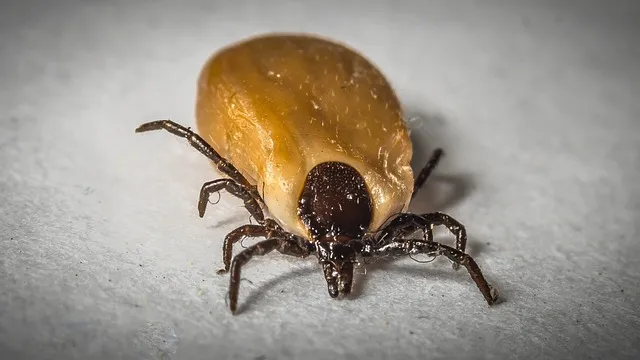Mosquitoes and ticks, active during dawn and dusk, prefer warm-blooded animals for feeding. To combat them effectively, eliminate standing water sources, maintain a manicured lawn, and use natural repellents or chemical treatments as needed. Long-term strategies include regular yard maintenance, planting mosquito-repelling plants, and strategically placing birdbaths or ponds to attract beneficial insects. Combining these methods creates an outdoor space that minimizes pest presence for a more enjoyable experience.
Keep your yard pest-free with our comprehensive guide to mosquito and tick control. Discover effective strategies to understand, identify, and eliminate breeding grounds for these pests in your outdoor space. Learn about natural repellents, explore chemical control options, and find companion strategies for preventing ticks. Additionally, we provide long-term management tips for sustained protection. Implement these techniques to create a peaceful, pest-free sanctuary in your own backyard.
Understanding Mosquito and Tick Behavior

Mosquitoes and ticks are often misunderstood creatures, but understanding their behavior is crucial for effective mosquito and tick control. These insects are primarily active during dawn and dusk, when they seek blood meals from warm-blooded animals, including humans. They are attracted to carbon dioxide, body heat, and specific chemicals in our sweat, making outdoor activities during these times more susceptible to bites.
Knowing their preferences helps us develop strategies for prevention. For instance, keeping yards well-trimmed and removing standing water, where mosquitoes breed, can significantly reduce their presence. Regularly treating outdoor living spaces with approved insecticides also proves effective. Additionally, using personal protective measures like repellents containing DEET or natural alternatives like citronella can further deter these pests, ensuring a more comfortable outdoor experience.
Identifying Breeding Grounds in Your Yard

Mosquitoes thrive in standing water, so identifying and eliminating breeding grounds is a key step in mosquito and tick control. Check your yard for any stagnant water sources like buckets, flower pots, old tires, or clogged gutters. Even small amounts of water can become a breeding ground for mosquitoes, which lay their eggs just above the waterline. Regularly inspect and empty containers that hold water to prevent these areas from becoming mosquito magnets.
Additionally, consider the vegetation in your yard. Mosquitoes seek out dense, shady areas with plenty of greenery. Trim back overgrown plants and trees, and mow grass regularly to reduce these habitats. Maintaining a well-manicured lawn and open spaces will make your yard less inviting for mosquitoes and contribute to effective tick control measures as well.
Natural Repellents and Their Effectiveness

Many homeowners seek natural alternatives for mosquito and tick control, preferring eco-friendly methods to traditional chemical sprays. Natural repellents offer a safe and effective way to deter mosquitoes from your yard. Planting certain herbs like citronella, lavender, marigolds, and basil is a popular choice. These plants contain compounds that repel mosquitoes naturally, providing a pleasant aroma and a mosquito-free environment. For instance, citronella grass has been used for centuries in traditional insect repellents due to its high citral content, which masks human odours and discourages mosquito feeding.
Beyond herbs, certain essential oils like lemon eucalyptus, peppermint, and tea tree oil are potent natural repellents. These oils can be mixed with water and sprayed around the yard or diluted in candles and torches for outdoor use. While their effectiveness may vary based on factors like wind and temperature, many find them to be a reliable part of an integrated mosquito management strategy, complementing other practices for comprehensive mosquito control.
Chemical Control Options for Mosquitoes

Chemical control options play a significant role in effective mosquito and tick control for yards. Common chemical treatments include insecticides, repellents, and larvicides that target adult mosquitoes, their eggs, or larvae. Insecticides are powerful chemicals designed to kill adult mosquitoes upon contact, making them effective for immediate relief. Repellents, on the other hand, create a barrier against mosquitoes by masking human odors or deactivating mosquito-sensing chemicals on the skin. Larvicides, applied to standing water sources, inhibit the development of mosquito larvae into mature insects.
When considering chemical control, it’s crucial to select products approved for outdoor use and follow manufacturer instructions strictly. Professional pest control services often offer specialized treatments tailored to specific needs, ensuring long-lasting protection. Additionally, combining chemical methods with physical barriers like screens and proper water management practices can significantly reduce mosquito populations in yards, contributing to a healthier and more comfortable outdoor environment.
Preventing Ticks: Companion Strategies

Keeping your yard free from mosquitoes isn’t just about swatting at bites; it’s also about preventing other pests, like ticks, that can carry diseases. While mosquito control methods often take center stage, integrating companion strategies for tick control is equally vital. This involves creating an environment that discourages both mosquitoes and ticks from thriving.
One effective approach is to maintain a well-trimmed lawn and remove any dense vegetation or piles of wood, as these areas provide ideal hiding spots for ticks. Additionally, regularly cleaning and maintaining outdoor spaces by removing standing water—a breeding ground for mosquitoes—can significantly reduce their population. Using natural repellents like citronella plants or lavender in garden design can also help keep both pests at bay.
Long-Term Management and Maintenance Tips

Implementing long-term mosquito and tick control strategies is key to maintaining a comfortable outdoor space. Regular yard maintenance plays a vital role in prevention. Keep your lawn well-manicured, removing high grass and brush where mosquitoes breed. Ensure proper drainage to eliminate standing water, as it serves as a breeding ground for these pests. Planting natural mosquito-repelling plants like citronella, lavender, or marigolds around your property can also be effective.
Additionally, consider installing features like birdbaths, ponds, or wetlands strategically to attract beneficial insects that feed on mosquitoes while minimizing the presence of these irritating and potentially dangerous vectors. Regular inspection and cleaning of these water bodies are essential for maintenance. By combining these practices, you create an environment that discourages mosquito breeding and promotes a more enjoyable outdoor experience.
